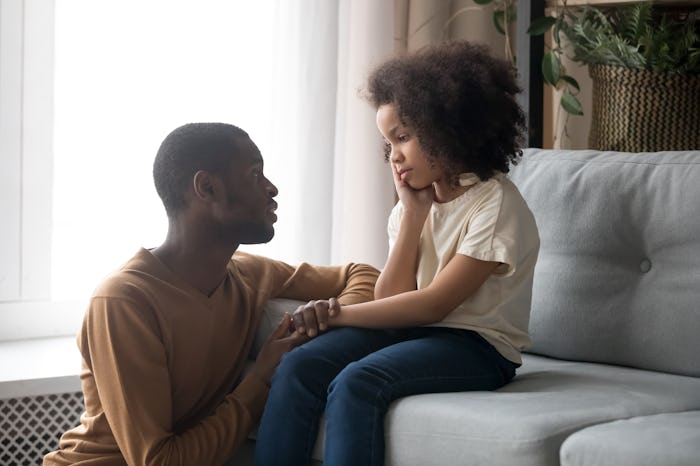Life

Here's How To Talk To Your Kid About Your Mental Health, Even Though It's Hard
As a mental health advocate and someone who lives with depression and anxiety, I think a lot about how best to communicate about the various mental health conditions that affect millions of adults each year. But I also often think about how I will best explain to my daughter what it is that I experience on a daily basis. And if you’re also wondering about how to talk to your kid about your mental health, it turns out there are a few things that we can keep in mind. I’ve learned a lot about what to say (and not to say) and how to best approach someone who may be struggling.
"Explaining a mental health condition can be complicated, even more so when you are trying to find the right words to describe it to a child," says Dr. Christina Iglesia, a licensed clinical psychologist in the San Francisco Bay Area and founder of the mental health action campaign #therapyiscool. "Parents should keep the child’s age in mind when discussing mental health as the majority of children don’t have a working knowledge of clinical terms such as anxiety or depression."
Iglesia tells Romper that the rule of thumb to keep in mind is the younger the child, the more basic the conversation should be.
"For elementary school children, many parents liken their mental health challenges to physical ones since children are able to understand the concept of having the flu and not feeling well,” she says. “Middle or high school children tend to understand more about mental health and usually already hold preconceived notions about what it means to have a mental health condition."
Iglesia adds: "These conversations can be especially important as it allows for misinformation to be corrected and a deeper dialogue to develop."
And with 1 in 5 adults saying they experienced some form of a mental health issue in 2018, according to the National Alliance on Mental Illness, the conversation is, perhaps, more important than ever.
But make sure you head into a discussion with your children prepared to take on questions, Iglesia says.
"After a parent explains their mental health struggles, it is imperative that they then make space for their child to ask questions or vocalize concerns," she says. "Generally speaking, the older the child the more questions or concerns they will have. Some children will also want more specifics while other children will want the parent’s reassurance that everything is OK."
Regardless of how you thought the conversation would go down, Iglesia says it's key that parents put aside their agendas. If you notice your child is becoming upset or shutting as a result of the conversation, then you need to meet your child where they are.
"Always keep the door open for the child to circle back and ask additional questions at a future date," she says.
Which is also important because, even though information about mental health is more readily available in 2019, "it is still very hard for families to speak about mental health conditions," Iglesia says.
"There is a mindset that children 'don’t really need to know' about what is going on with their parents," she says. "Yet children can sense when their parent is struggling and will likely create a worse case scenario if they are not armored with the facts."
Instead, Iglesia recommends parents use the opportunity as a moment to highlight the importance of talking about difficult things, like mental health.
"This will allow for the family moving forward to have a more open channel of communication and a deeper foundation of trust," she says.
Which is really something worth aiming for, right?
If you or someone you know is experiencing suicidal thoughts, call the National Suicide Prevention Hotline at 1-800-273-8255 or text HOME to the Crisis Text Line at 741741. You can also reach out to the Trans Lifeline at 877-565-8860 or the Trevor Lifeline at 1-866-488-7386, or to your local suicide crisis center.
Expert:
Dr. Christina Iglesia, licensed clinical psychologist in the San Francisco Bay Area